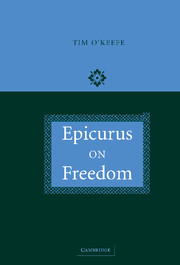Book contents
- Frontmatter
- Contents
- Acknowledgments
- List of abbreviations
- Introduction
- Chapter 1 What sort of an incompatibilist is Epicurus?
- Chapter 2 Lucretius on the swerve and voluntas
- Chapter 3 Aristotle and Epicurus on the origins of character and action
- Chapter 4 Epicurus' reductionist response to Democritean fatalism
- Chapter 5 The swerve and collisions
- Chapter 6 The swerve and fate
- Chapter 7 Epilogue: Epicurus and the invention of libertarian free will
- Appendix: Some texts
- References
- Index
Chapter 3 - Aristotle and Epicurus on the origins of character and action
Published online by Cambridge University Press: 22 September 2009
- Frontmatter
- Contents
- Acknowledgments
- List of abbreviations
- Introduction
- Chapter 1 What sort of an incompatibilist is Epicurus?
- Chapter 2 Lucretius on the swerve and voluntas
- Chapter 3 Aristotle and Epicurus on the origins of character and action
- Chapter 4 Epicurus' reductionist response to Democritean fatalism
- Chapter 5 The swerve and collisions
- Chapter 6 The swerve and fate
- Chapter 7 Epilogue: Epicurus and the invention of libertarian free will
- Appendix: Some texts
- References
- Index
Summary
A natural strategy to pursue when trying to understand Epicurus' position is to find a precedent in the works of previous philosophers in the light of which we can better understand how Epicurus thinks the swerve preserves our freedom. After all, it is more likely that the swerve was introduced by Epicurus as a reaction to a problem already placed on the philosophical agenda by his predecessors, instead of it being a radically new innovation without precedent. The predecessor most commonly enlisted to play this role since David Furley's influential study is Aristotle.
I am quite sympathetic to this way of approaching Epicurus' thought. In fact, I will be arguing (in chapter 6) that a key to understanding Epicurus' use of the swerve is to look back to Aristotle's arguments in de Int. 9, in which he contends that the unrestricted application of the Principle of Bivalence to all statements (including ones concerning contingent matters in the future) would have unacceptable fatalist consequences. In this chapter, however, I will be examining a different set of Aristotelian texts, particularly those dealing with voluntary action in Nicomachean Ethics book 3. In NE 3, Aristotle says that, in order for an agent to be responsible for what he does, the ‘origin,’ or archê, of his action and character must be within him.
- Type
- Chapter
- Information
- Epicurus on Freedom , pp. 48 - 64Publisher: Cambridge University PressPrint publication year: 2005



